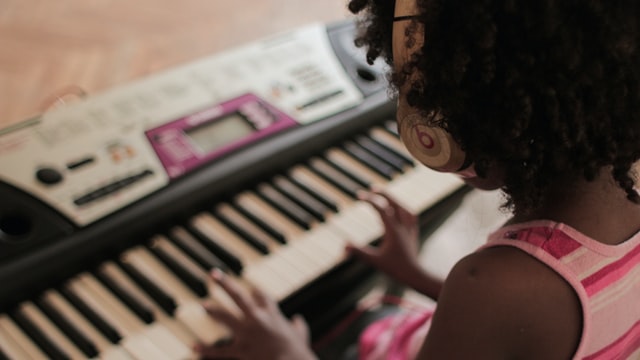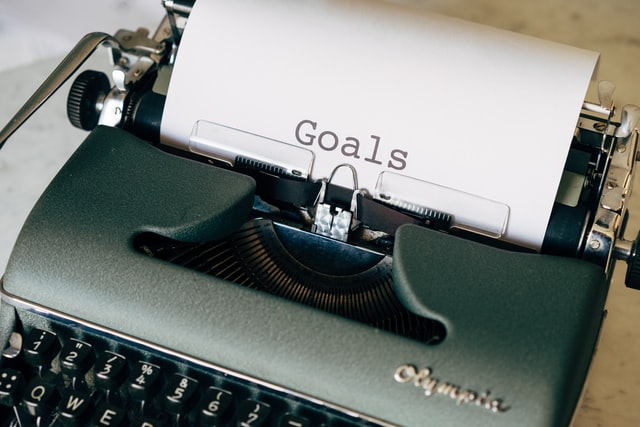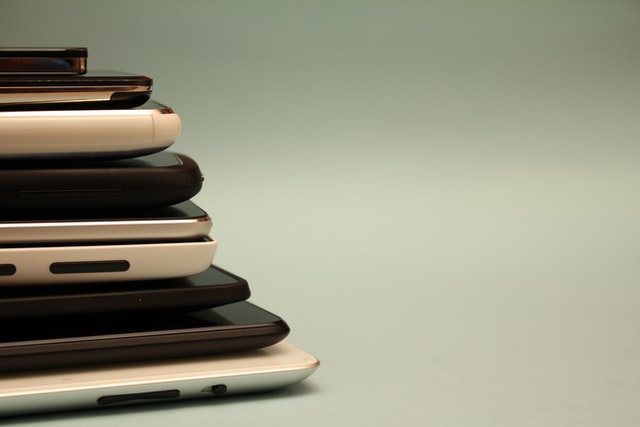In this guide, we’ve put together 12 piano learning tips. Think of this as a “things we wish we’d known when starting out” guide. 12 useful tips and reassuring sentiments to help you through the early stages of learning how to play the piano.
It’s intimidating when you get started, especially if you decide to teach yourself piano with the help of some online learning materials. You will end up with a lot of questions. “Am I doing it right?” “What on earth does this sign mean?”
Our piano learning tips are here to help, and to make sure you know that nobody gets it right the first time, and getting to the point where you can play the piano properly is going to take some time and effort. All your favorite piano players were at the stage you are currently at once.
So, without hesitation, on to our ten top piano learning tips!
Piano Learning Tips for Beginners
1. Have a Goal For Every Practice
It is incredibly easy to just float along through your piano practices, but you’ll rarely come out of your comfort zone or test yourself this way. It’s easy to stagnate. We think the best way is to have a specific goal for each and every practice session. This doesn’t have to be a big goal, either, as you won’t want to make life overly difficult for yourself or put yourself off with unrealistic targets.
Having a goal can form part of a bigger curriculum or practice plan. If you are following the Pianu academy or another course, or even a book on learning the piano. The next chapter or step will be in place for you, which is one of the benefits of following a structured course.
Work on the next step, and the next piece of information so that you are always moving forward. It might be as simple as “today, I am going to learn how to play a C Major and C Minor chord”. There is absolutely nothing wrong with going “slow and steady” on your way to becoming a piano player, and it might be easier for a lot of people who are short on time.
Having a goal for your practice is not just about moving in the right direction, it’s also about marking your progress. A sense of achievement after every practice session will help you to stay motivated and get excited about the next practice. If you don’t take this approach, it is easy to feel like you’re losing your way, even if you are making some progress. Mark the progress and take the little wins.
2. Phones and Devices on Silent Mode
You know the drill. Your friend sends you a cute cat video, and before you know it you’re 30 minutes into watching cats getting scared of cucumbers and you’ve made no progress towards the next piece you want to play.
The point is that you need to ensure there aren’t distractions surrounding you all the time. Notifications can be the worst enemy of a pianist, and even if you go into your practice with the best intentions, a message can see you get waylaid.
We’re so used to being plugged into our devices 24/7. It can feel difficult to just flick the switch to turn to silent mode in case you miss something important. The chances are that you will only be missing out on those cat videos.
Even if you just give yourself 15-20 minutes with no distractions, it will help you to have a more focused session and increase the chances of retaining information.
There is a slightly conflicting view here, discussing the merits of sometimes practicing when there are distractions. The Bulletproof Musician article is interesting, but having distractions is not likely to be conducive to learning in the vast majority of situations.
We’re not going to start slating the use of phones in general, but check out this guide on the impact smartphones have on focus to help you understand why we recommend staying away from the smartphone while practicing.
3. Regularity is Key
We live in an age of flexible learning. If you start wondering what a G minor scale looks like at 3am when you can’t sleep, there is nothing stopping you from finding out. If you follow the Pianu academy course or another online learning platform, you can log in 24/7.
We have a wealth of information available to us, so it doesn’t matter when you practice. The important thing is that you do practice, and regularly.
A lot of people take the approach of 20 minutes a day. This shows that learning doesn’t have to involve long, mammoth sessions. Many studies back up the idea that short bursts of practice are far better and that information will stick better if you take a “little and often” approach.
You don’t have to practice every day either. Five times a week is a good approach and it gives you the chance to have breaks, but realistically, there are bound to be times where you practice more and times you practice less. Ultimately, you need to make sure you keep coming back to the piano.
There are so many learners who stumble towards their targets. They might go for three weeks without practice, then see a piano player they love and practice non-stop for the weekend. These sorts of up and down practice sessions aren’t the optimum way to do things.
4. Don’t Overdo Things
This is another mistake that people make time and time again. When you get a new hobby, it’s normal to be excited, but this doesn’t mean you should overdo it. It can be easy to get obsessive to start with and practice for four hours a day. Don’t.
Have you ever found a new flavor or food that you love and eaten it non-stop for weeks? The chances are, by the end, you never wanted to eat it again. This is the easiest way to put yourself off when you are learning how to play the piano. It’s important to moderate yourself even if you are incredibly excited about your new hobby and your new skill.
There is a lot of frustration that goes along with playing the piano, to go with all the reward and enjoyment. Everyone has a different level of tolerance for playing, some people will not get bored after hours each and every day, but others will find that short, 20-30 minute sessions will be enough.
You can definitely have too much of a good thing.
5. Get Feedback (Even if Self-Teaching)
Following a course and teaching yourself is a fantastic tool and something that was so much harder 10 or 20 years ago than it is today. You can learn how to play the piano without ever coming into direct contact with a piano teacher. iPads, MIDI keyboards, and the endless font of knowledge that YouTube provides means that learning the piano can be more interactive and straightforward than ever.
The Pianu academy is a great way to get feedback while you are learning. It can tell you whether or not you are playing the right notes at the right times and only allow you to progress to the next step once you have fully understood.
This is the risk of teaching yourself. It is easy to learn bad habits and learn something slightly incorrectly, but never have anyone point it out to you. For example, a piano player who teaches themself how to play might have a slightly incorrect understanding of something, or have the wrong hand position. If you are doing something in a way that is not optimal, you might never realize if you don’t get feedback.
Getting feedback can be as simple as having an occasional lesson online using Skype or Zoom. Another great way to boost your knowledge is to work with other musicians. If you have friends who can play the piano or keyboard, these can be the perfect sounding board for you. Practicing with others is a great way to cement your knowledge.
The feedback issue brings us to the point of whether or not you should work with a tutor or teacher, or whether you should self-teach. There are many different ways to get to the same end result. It isn’t essential that you get lessons in person, but if possible, you should try to enhance your knowledge with other musicians in the room with you. You can even film yourself playing and send it to your musician friends to analyze your technique and playing.
Don’t obsess over this. You will pick up most of the basics without having to get feedback, but at some point, you will need your playing to be checked by someone who knows what they’re doing just to ensure you haven’t missed anything obvious.
6. Work On Music You Love
We talk to a lot of people who have successfully learned how to play the piano, and we talk to a lot of people who have given up. One of the most common reasons for people giving up on the piano is that they are not enjoying lessons, and having to learn the songs that a teacher has chosen for you.
You need to get a variety of different skills. The very first steps you take, it won’t matter too much what type of music you are playing at this stage. Our academy is designed to walk you through different techniques by teaching you songs using those specific techniques, but eventually, you will graduate to learning songs because you want to.
You could learn a piece of music by Rachmaninoff in a lesson, and though it may be an incredible achievement, what does it matter if you aren’t going to enjoy playing it for people? You probably have an image in your head of the types of music you want to learn, and whether that’s Queen songs or Beethoven songs is up to you. The point is that learning music you love is the best way to stay motivated.
Can you remember doing music lessons in school and getting bored of the song choices? If you are learning on your own then you can make sure this doesn’t happen.
7. Vary The Music You Are Playing
While you should always look to play songs you enjoy wherever possible, you should also try and take on a variety of different styles of music so you can ensure that you don’t end up with a narrow range of skills. Even if you know that you are going to be playing the same style of music in 99% of scenarios, you might learn something new by pushing yourself out of your comfort zone.
It certainly won’t harm your piano skills to learn a new set of skills and try to play in a different way to the style you are used to. Why not attempt a jazz song or try to learn something classical for a change?
Variation also helps to keep things fresh and interesting for you, so you don’t feel like you are covering the same ground time and time again.
If you are stuck for new ideas, why not look at songs in the charts, or find out about a new composer, and try to learn some of their songs? This is a great way to expand your repertoire.
Variation doesn’t just have to come from learning new songs. Why not try a few different things to cement your knowledge? For example, you could try to play each hand individually, or try to play the melody on the other hand. Alternatively, you could play at a different tempo and see if you can keep up. These are all different ways that you can make your playing more well-rounded. Find new ways to challenge yourself.
8. Half of The Playing is in The Listening
Understanding music is one of the most important skills to learn. Without an understanding of how music works then you are going to struggle to play to a high standard. Luckily, listening to music can be done pretty much any time, when you are in the car, in the gym or while you study. There are many opportunities to listen to compositions and use them to expand your understanding and playing capabilities. Try to analyze the playing, memorize the movements, or even just tap along with the timing of a piece of music in order to get better at understanding time signatures and tempo.
If you are going to learn how to play piano by ear, eventually it might be your goal to be able to pick out notes and chords. Eventually, the way a piano sounds will become second nature to you and you develop an intuition.
You don’t have to study every piece of music you enjoy, but just trying to view it in a more analytical way is a fantastic way to improve your skills without even looking at a piano.
9. Don’t Overstretch
Learning the piano is a process. It doesn’t matter whether you approach it with a positive attitude or not if you ask too much of yourself. If you are self-teaching, there is also nobody there to moderate your learning and tell you when you might be over-reaching.
There are a huge number of people who go into their first day playing the piano hoping to learn how to play their favorite song of all time or master a few jazz songs in a day. It’s relatively quick to get the basics right but to get to a high level of playing you will need to constantly and gradually advance your playing rather than try to reach for unrealistic songs.
It’s good to be ambitious, but the old saying rings true; don’t try to run before you can walk. Baby steps are the best way to get to the end result of being able to play the piano to a good standard. If you overstretch you are far more likely to give up.
10. Don’t Skip The Fundamentals
There are some aspects of playing the piano that can be a little bit…boring. There is no way to avoid this.
Learning things like scales may not be the most rewarding part of learning to play. Understanding hand positions might feel like a lesson you are learning out of necessity rather than something you enjoy. However, in order to get to the really fun aspects of playing the piano, you need to make sure you’ve got some of the basics perfected. It pays off in the long run.
As we’ve already alluded to, following a course is a great way to ensure that none of the absolute basic, fundamental techniques, and skills get ignored or forgotten about.
It’s difficult to motivate yourself to learn some of the more bland elements of playing the piano, but certain things can’t be ignored.
11. Teach Your New Skills to Someone Else
As soon as you have picked up a new piece of knowledge, it is a good idea to try to teach it to someone else. Frank Oppenheimer was a big ambassador of the statement and Latin principle “Docendo discimus” which translates as “the best way to learn is to teach”.
This isn’t just a clever historic philosophy, studies back it up. Check out this fascinating discussion on the learning by teaching method. “Students who spend time teaching what they’ve learned go on to show better understanding and knowledge retention than students who simply spend the same time re-studying”
Teaching someone ensures that you have fully understood a concept, enough that you can explain it properly to someone else. It is a unique way to embed those skills in your brain so that you don’t end up with half-formed knowledge. In order to teach, you need thorough knowledge yourself, and your brain will have to focus in a new way. Knowledge will stick if you have to recite it.
It doesn’t really matter who you teach, but it is a good idea to buddy up. Perhaps you have a friend, family member or partner who is interested in learning, who can stay one step behind you, allowing you to teach new concepts as you become familiar with them.
12. Prepare Yourself For Setbacks
This is one of the most important pieces of advice you can get at the start of your journey. We’ve saved it till last on our list of piano learning tips.
Setbacks are inevitable.
We won’t get too philosophical about life, but in the journey to learning the piano, there are definitely likely to be setbacks. A couple of weeks where you don’t practice, a hand injury, a day where you get incredibly frustrated and storm out of your lesson. Setbacks happen.
Nobody sits at a piano and starts to play perfectly in minutes. It takes a lot of time, a lot of patience, and more importantly, it takes perseverance to get to a professional level, or even a passable level of skill on the piano. You need to do things your way, but accept that things will go wrong and there is a lot that can cause you frustration along the way. For every frustrating moment, there will eventually be a moment of satisfaction or thrill as you master the song you have always wanted to learn. In the times when you feel like giving up, remembering this is one of the best ways to motivate yourself.
Conclusion – Piano Learning Tips
The journey to becoming an accomplished piano player is likely to be far more enjoyable if you take our piano learning tips on board.
Learning piano shouldn’t be a chore. However, if you don’t plan ahead and prepare yourself for mental challenges then it certainly can get frustrating at times.
Our tips are all designed to help you, and there is no point in “sweating the small stuff”. As long as you are generally moving in the right direction and improving your knowledge then you shouldn’t be too anxious about whether or not you are doing things right.
Practice regularly, find a way to keep coming back to the piano when times get hard and, most importantly, try to enjoy the journey.













